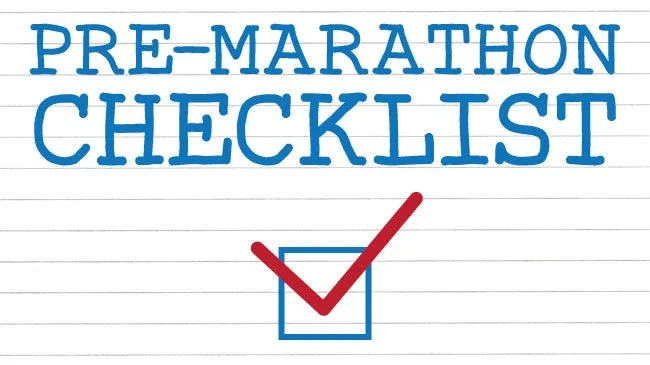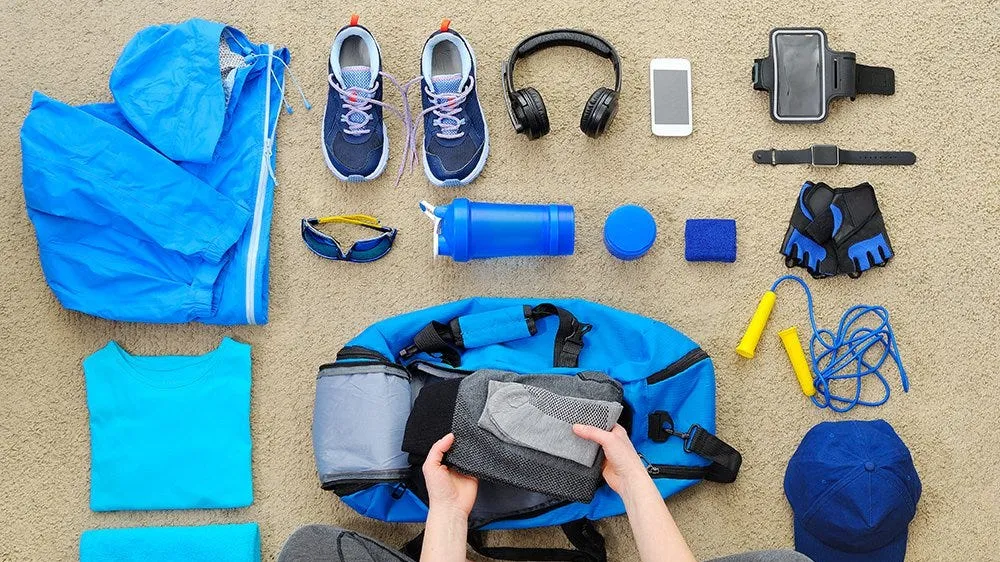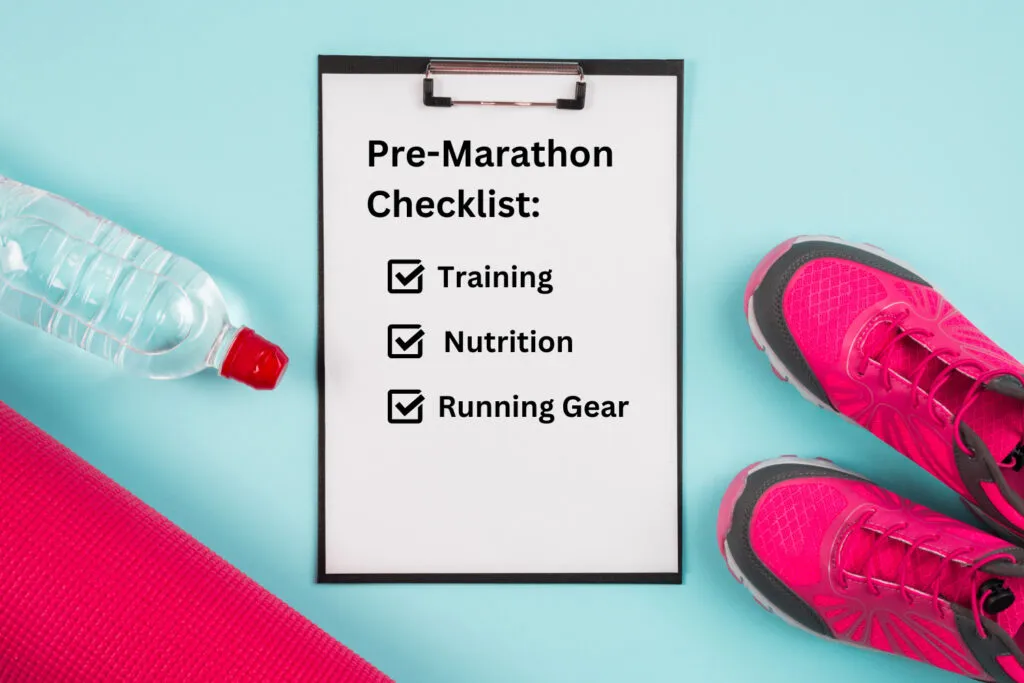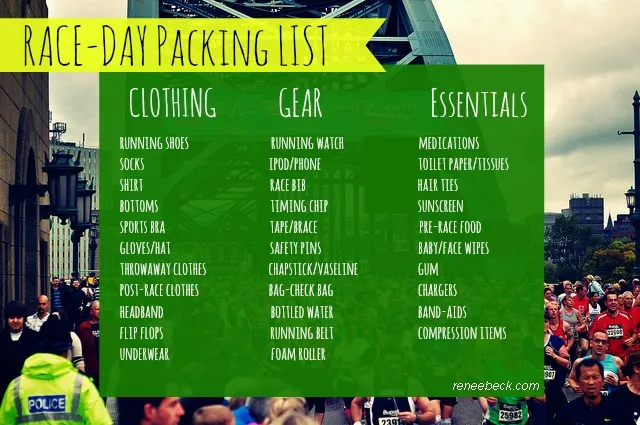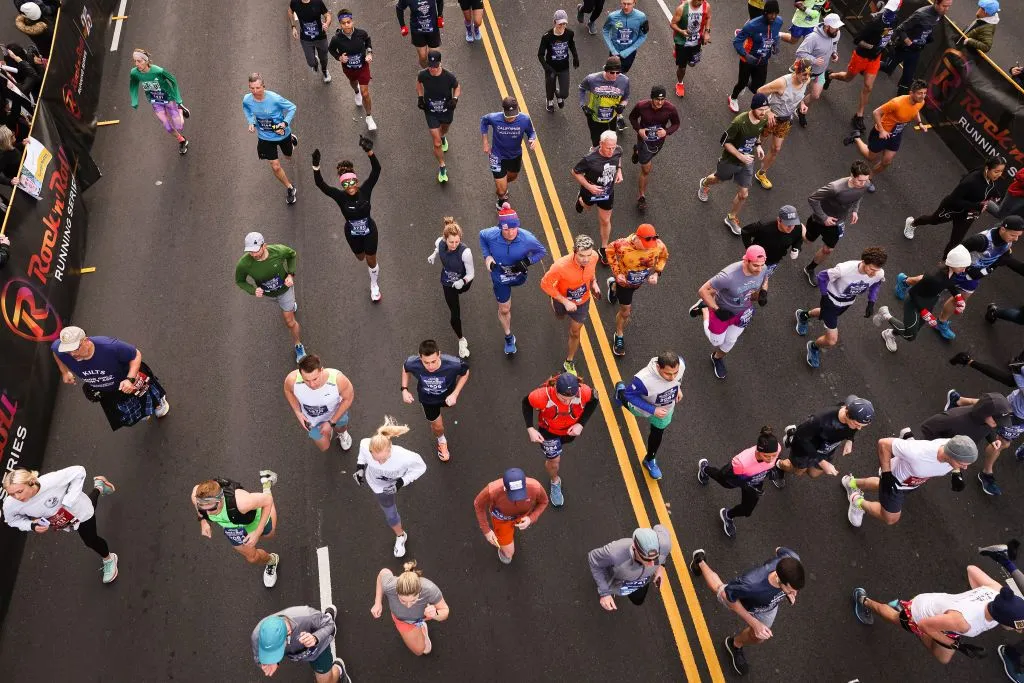Planning for your next big race—or tackling your first-ever marathon? Whether you’re a seasoned runner or just starting your marathon journey, having a well-thought-out race-day checklist can mean the difference between a stressful morning and a seamless, satisfying run. From knowing what not to do before a marathon to making sure you’ve packed the right gear, the details matter.
That’s why we’ve put together the ultimate guide filled with expert marathon tips to help you feel fully prepared. Whether you’re aiming to walk a full marathon or shave minutes off your time, this comprehensive list covers it all—training tips, what to eat before a marathon, gear essentials, and recovery advice. Think of it as your personal roadmap to success, built to answer questions like, “What should I eat the night before?” or “How long should I rest after a marathon?”
Let’s get you to that finish line feeling strong, confident, and injury-free—with everything you need and nothing you don’t.
1. Pre-Race Preparation Tips: What to Do Before a Marathon for a Smooth Start
Whether you're gearing up for your first marathon or you've already got a wall full of finisher medals, those pre-race nerves? Totally normal. After months of training and dedication, you're standing at the edge of something big. And with the right marathon tips, you can ensure race day goes off without a hitch—physically and mentally.
In this section, we’ll walk you through what to do before a marathon, including tips for managing nerves, fuelling smart, and locking in the right mindset. If you’ve ever Googled “What should you not do before running a marathon?” or “How do I get ready for race day without freaking out?”—this guide’s for you.
Shake It Out with a Light Run
One or two days before race day, consider doing a short, easy shakeout run. It’s not about training anymore—it’s about keeping your legs loose, easing anxiety, and settling into race mode. A 20- to 30-minute jog at a conversational pace is perfect. Many races even host community shakeout runs, which is also a fun way to meet fellow runners.
Fuel Up the Smart Way
Now is not the time to experiment with new foods. One of the biggest marathon mistakes to avoid is eating something unfamiliar and risking stomach issues. In the final 48 hours, keep meals high in carbs and moderate in protein, with low fat and fiber. Think pasta, white rice, bagels—easy-to-digest carbs that fill your energy stores without weighing you down. Wondering “What should I eat before a marathon?” Simple carbs are your best friends.
Hydration Is Non-Negotiable
Staying hydrated in the days leading up to the race is just as crucial as drinking water during the run. Instead of chugging water all at once, sip steadily throughout the day. Add electrolytes to your drinks to replenish essential minerals. Especially if you’ve traveled by plane, make sure you increase your water intake to stay ahead of dehydration.
Lay Everything Out the Night Before
One of the best long-distance running checklist tips? Prep your race-day gear in advance. Lay out your bib, clothes, shoes, watch, headphones, gels—everything you’ll need. If you're staying in a hotel, double-check breakfast hours or prep your own fuel so you’re not scrambling in the morning.
And don’t forget to charge all your electronics and set a meeting point with friends or family at the finish line—just in case your phone dies mid-run.
Visualize a Strong, Confident Race
Preparing your body is important—but prepping your mind is everything. If you’re feeling anxious, try visualization techniques. Picture yourself running with power, tackling each mile, and crossing that finish line with joy. Imagine the sounds, sights, and even the feel of your feet hitting the pavement. Combine it with box breathing (in for 4, hold for 4, out for 4, hold for 4) to stay calm and focused.
Build a Personal Pre-Race Ritual
Some runners listen to a power playlist. Others stretch, meditate, or even trim their toenails (seriously—it prevents runner’s toe). The goal? Find a routine that grounds you. One popular trick is using a body scrub or warm shower the night before—it relaxes your muscles and makes you feel refreshed and ready.
Get Rest—Even If You Can’t Sleep
It’s common to toss and turn the night before a race. Don’t sweat it. As long as you’ve slept well in the week leading up to the marathon, a restless night won’t ruin your performance. Aim for a calm, early evening—read, watch a feel-good movie, or simply relax with the lights off. Rest, even without sleep, still gives your body the chance to recharge.
2. Walking Marathon Tips: How to Train Smart for a 26.2-Mile Walk
Think you need to be a hardcore runner to complete a marathon? Think again. More and more people are embracing the challenge of walking a marathon, and the finish line feels just as sweet on foot. But here’s the real talk: just because you’re walking doesn’t mean you can skip the prep.
So, can you walk a marathon without training? Technically yes—but it’s absolutely not recommended. Covering 26.2 miles is no joke, and whether you’re walking or running, proper training is essential for finishing strong and injury-free.
Walking a marathon can take six to nine hours, which means your body will be under physical stress for a large chunk of the day. Without preparation, you’re opening the door to dehydration, muscle strains, blisters, and burnout. Below are our top walking marathon tips to help you train right and crush the course—no running required.
Design a Diverse Training Schedule
Marathon training for walkers doesn’t mean walking endlessly on a treadmill. Your walking marathon training plan should include variety: long-distance walks, shorter power walks, and even non-walking workouts like yoga or CrossFit. Aim to train four to five days per week, rotating between endurance and strength-based movement to avoid overuse injuries and build full-body stamina.
Increase Your Mileage Gradually
One of the biggest mistakes people make when training to walk a marathon? Ramping up too fast. Don’t fall into the trap of thinking slower pace equals faster progress. Instead, build your walking mileage gradually over a span of 12 to 16 weeks. If you’re a total beginner, start training at least four months in advance, working up to long walks of 15–20 miles to simulate race conditions. Your goal is to boost stamina without overloading your body.
Don’t Skip the Stretch
Every training walk should end with a cool-down stretch. Stretching improves your range of motion, prevents stiffness, and helps your muscles recover faster. Try focusing on your calves, quads, hamstrings, and hip flexors. If you’re short on time, prioritize post-walk stretches—they're more critical than warm-ups when it comes to reducing soreness and preventing injury.
Gear Up with the Right Footwear and Clothing
What should you wear to walk a marathon? Comfort is key—especially when you’ll be moving for over six hours. Swap running shoes for supportive walking shoes with flexible soles and good arch support. Look for moisture-wicking clothes that minimize chafing, and consider adding cushioned insoles to your shoes for extra shock absorption. Bonus tip: break in your gear before race day to avoid unpleasant surprises.
Stay Hydrated and Fuel Smart
Hydration is just as critical when walking a marathon as it is when running one. Start sipping water early and regularly—don’t wait until you’re thirsty. Add electrolytes if you’ll be sweating for extended periods. For fuel, opt for easy-to-digest snacks like energy bars, bananas, or small sandwiches. A classic pre-marathon breakfast? Porridge topped with fruit, like sliced banana or berries—simple, steady fuel.
Choose a Walker-Friendly Marathon
Before you register, double-check that the event allows walkers. Not all marathons keep aid stations open long enough or allow for extended course times. Some roads may even reopen to traffic before slower participants finish. Look for walker-friendly marathons with generous time limits—many even welcome charity walkers, such as Cancer Research UK’s Shine Night Walk series. Choose one that celebrates your pace, not penalizes it.
3. Marathon Nutrition Tips: How to Fuel Your Body from Training to Race Day
When it comes to marathon success, training and nutrition go hand in hand. You can log all the miles in the world, but if your body isn’t properly fueled, race day can unravel fast. Sadly, marathon nutrition is often an afterthought—until it's too late.
Whether you’re a first-timer or a seasoned runner, questions like “What should I eat before a marathon?” or “How do I carb load correctly?” are super common. So here’s your no-fluff, fully practical guide to marathon nutrition, from weeks before the race to the final hour before the starting gun.
How Do I Fuel for a Marathon?
Marathon fueling doesn’t begin the week before the race—it starts in training. Think of your nutrition plan as an extension of your training plan. You wouldn’t test new shoes on race day, right? Same goes for food.
Here’s what to do early on:
-
Experiment during long runs. Try different snacks, gels, or drinks during training to see what your body handles best.
-
Know the course support. Research what gels, drinks, or snacks will be available at aid stations.
-
Start carb-loading early. Begin boosting carbohydrate intake a few days out to fill glycogen stores.
-
Stick to familiar foods. Eat a tested pre-race breakfast 3–4 hours before start time, low in fat and fiber.
-
Hydrate steadily. Bring a water bottle and sip regularly—don't wait until you're thirsty.
Start Nutrition Prep Weeks Ahead
Your marathon nutrition plan should start at least 8 to 10 weeks out, especially on your long-run days. That’s your lab—use it to dial in what works and what doesn’t. Look up the weather forecast, know the terrain, and practice eating under similar conditions.
Find out what the race provides in terms of hydration and snacks—like Gatorade, bananas, or energy gels. If those don’t agree with you, switch them out and practice with your own products. Discovering your stomach’s limits on race day is not the vibe.
Create a Personalised Marathon Nutrition Plan
No two runners have the same needs. Figure out not just what to eat but when. Here's how:
-
Test your fuel timing during your long runs.
-
Try out on-course nutrition options (like sports drinks or gels).
-
If needed, bring your own portable fuel like energy chews, carb drinks, or electrolyte mixes.
Keep a simple rule: if it hasn’t been tested in training, don’t try it on race day.
Smart Carb Loading Before the Marathon
Let’s bust a myth: carbo-loading doesn’t mean scarfing down pasta until you burst. It means shifting your macros, so more of your daily calories come from carbs rather than fats or proteins.
Here’s how to carb-load the right way:
-
Start 2 to 3 days before the race.
-
Choose easy-to-digest carbs like rice, pasta, oatmeal, or potatoes.
-
Reduce fat and fiber to avoid stomach issues.
-
Eat your last big meal at lunchtime the day before the race; have a lighter dinner.
Pro tip: if you’re traveling for your race, book a restaurant early so you’re not stuck waiting for a table or defaulting to fast food. Your legs will thank you the next morning.
What to Eat on Marathon Morning
Your pre-marathon breakfast is essential. While you sleep, your liver glycogen depletes. A good breakfast tops off those energy stores and delays fatigue (aka "the wall").
Best practices:
-
Eat 3 to 4 hours before the race (2 to 3 hours is okay if you’ve practiced it).
-
Choose familiar, carb-rich foods—aim for at least 100 grams of carbs.
-
Avoid excessive fiber, fat, and protein.
-
Popular breakfast ideas: bagels and peanut butter, oatmeal with banana, waffles and syrup, rice bowls, or energy bars.
And yes—check your urine color. Pale = hydrated. Dark = drink more (but don’t overdo it).
What to Eat and Drink During the Race
During the marathon, your goal is to stay ahead of fatigue, not react to it. Here’s how to fuel while on the move:
-
Start fueling early, ideally within the first 30–45 minutes.
-
Consume 30–60 grams of carbs per hour (via gels, chews, sports drinks, or fruit).
-
Drink water or electrolyte drinks at regular intervals—even small sips help.
Practice eating and drinking during your long runs to prevent race-day surprises like cramping or GI distress.
The Hour Before the Gun Goes Off
The final 60 minutes before the start can be nerve-wracking. Use this time wisely:
-
Sip on water or an electrolyte drink.
-
Take a gel or drink with simple carbs about 15 minutes before you start.
-
Walk around to stay loose—but don’t burn energy pacing in circles.
Whatever you take in during this hour will kick in just as you're hitting your stride—literally. Include this carb intake in your total hourly nutrition calculation.
What to Eat During a Marathon: Fuel, Fluids, and Performance Boosters
Running 26.2 miles is not just about mental grit and leg strength — it's also a masterclass in fuel strategy. What you eat (and drink!) during a marathon can make or break your race. The name of the game? Carbs + fluids — in the right amount, at the right time.
But don’t just wing it. Underfueling can lead to the dreaded bonk, while overfueling may land you in serious GI distress. Here’s how to fuel smart, sip right, and crush your race without a pit stop panic.
Fluid Strategy: How Much Water Should You Drink During a Marathon?
Hydration is crucial — but more isn’t always better. Drinking too much can lead to hyponatremia, a dangerous drop in sodium levels. The sweet spot lies in matching your sweat rate.
How to Calculate Your Sweat Rate:
-
Weigh yourself before and after a long run (wearing the same clothes).
-
Subtract your post-run weight from your pre-run weight.
-
Add in the fluid you drank during the run.
-
The result is your sweat loss per hour.
Pro tip: Use online sweat calculators to make this easier.
On race day, each aid station cup usually holds about 150 ml (5 oz) — but you’ll only drink around 100 ml (3 oz). Your body can typically absorb about 180–210 ml (6–7 oz) every 15 minutes, or 720–840 ml (24–28 oz) per hour. With consistent training, you can improve your gut’s ability to handle these volumes.
What to Eat During a Marathon: Carbs Are King
When it comes to marathon fueling, carbohydrates are your rocket fuel. During the race, your body taps into its glycogen stores, and without enough external fuel, you’ll crash.
How Many Carbs to Eat During a Marathon?
- For most runners, aim for 50–70 grams of carbs per hour.
-
If you're finishing in 4–5 hours, the lower end of that range works.
-
Aiming for 3 hours or less? You may benefit from higher carb intake — just test it in training.
Studies even show a dose-response effect — more carbs can mean better performance, up to a point. But too many can lead to GI issues, so practice is essential.
Best Sources of Carbohydrates During a Marathon
| Food Item | Carb Content |
|---|---|
| 1 Banana | 24–30 g |
| Energy Gel | 21–27 g |
| Energy Bar | 20–40 g |
| 4–5 Energy Chews | 16–25 g |
| 10 Jelly Beans | ~11 g |
Practice makes perfect: Train your gut by using the same gels, bars, and drinks you'll consume during the race. Your GI system is highly adaptable — so treat nutrition like a skill, not an afterthought.
Never try new products on race day. Even a magical-sounding gel can turn evil mid-marathon if your stomach hasn’t seen it before.
Sodium and Electrolytes: A Light Sprinkle Goes a Long Way
Electrolytes help your body absorb fluids and prevent cramps — sodium is especially important. Most runners lose some sodium through sweat, but a marathon usually isn’t long enough to cause critical sodium loss.
So yes, you can benefit from a little salt in your drinks or gels. Just don’t go overboard — especially if your diet is already sodium-rich.
Caffeine During a Marathon: Performance Perk or Pitfall?
Caffeine is a well-studied, legit performance enhancer — it boosts alertness, lowers perceived exertion, and can even help mobilize fat stores for energy.
Recommended dose:
3 mg per kg of body weight (≈200 mg for a 70 kg person)
That’s about 1–2 shots of espresso or 4–6 caffeinated energy gels.
Know your limits: Some runners feel jittery, anxious, or crash hard after too much caffeine. If you’re caffeine-sensitive, stick with small doses and test it in training. Always.
What to Eat After a Marathon: Recovery Fuel (and a Little Indulgence)
Let’s be real. You’re probably not racing again tomorrow, so recovery nutrition doesn’t have to be dialed in like a pro cyclist — but a smart refuel can help your body bounce back faster.
Best recovery foods include:
-
Easily digestible carbs (rice, bread, fruit)
-
Lean protein (eggs, chicken, tofu)
-
Electrolytes and fluids (sports drinks, coconut water)
Rule of thumb: Try to eat a balanced meal or snack within 30–60 minutes post-race. That window helps restock glycogen and repair muscle damage.
4. The Ultimate Marathon Nutrition Checklist
When it comes to marathons, it's not just about pounding the pavement — it’s about what you put on your plate. Nutrition is your secret weapon. So here’s your ultimate, no-fuss, marathon nutrition checklist, broken down week by week, meal by meal, and moment by moment.
Stick to this, and you won’t just survive race day — you’ll thrive.
Weeks Before Race Day: Lay the Foundation
The marathon may be weeks away, but your fueling journey starts now. Think of this as your nutrition pre-game.
-
Know the Course: Study the race route and note what fluids and gels will be offered at aid stations.
-
Practice Everything: Run with the same drinks, gels, and snacks you’ll use on race day. No surprises.
-
Meal Rehearsals: Try different breakfast options and pre-race dinners during training to find what fuels you best.
-
Plan Your Dinner Out: Make a reservation for your pre-race dinner now — don’t risk eating mystery takeout or standing in line the night before.
2–3 Days Before the Race: Carbs, Calm, and Prep
This is where the carb-loading magic happens — but smart carb-loading, not stuffing your face.
-
Stock Up: Buy your race-day nutrition early (gels, chews, drinks). No last-minute scrambling!
-
Boost Your Carbs: Eat more carbohydrate-rich foods like pasta, rice, bread, sweet potatoes, and fruit — just don’t go overboard on calories.
-
Cut Back on Fiber: If you’re prone to tummy troubles, reduce fiber intake 1–2 days before your marathon.
-
Hydrate: Sip throughout the day and aim for clear or light-yellow urine. Skip the sugary drinks.
Race Morning: The Power Breakfast
Your body’s glycogen stores are running low when you wake up — so this meal is crucial.
-
Timing: Eat your breakfast 2.5 to 4 hours before the race.
-
Carbs Rule: Aim for 100+ grams of carbohydrates. Think oatmeal, bagels, waffles, bananas, or rice.
-
Avoid: High fiber, fat, or protein — they digest slowly and may cause GI issues mid-race.
-
Hydration Check: Urine light? You’re good. Dark? Drink a bit more water — but don’t chug.
The Hour Before: Topping Off the Tank
This is your final chance to prime your body for the miles ahead.
-
15 Minutes Out: Take one energy gel or small carb snack with a few sips of water.
-
Optional Caffeine Kick: If you’ve practiced it and tolerate it well, a low-dose caffeine gel or drink can give a little boost.
During the Marathon: Execute the Plan, Adapt If Needed
This is where the strategy meets the sweat.
-
Fuel Wisely: Aim for 30–60 grams of carbs per hour, depending on your pace.
-
Mix & Match: Use a combo of sports drinks, gels, chews, or bars to meet your goals. Just make sure you’ve tested them in training.
-
No Experiments: Race day is not the time to try a new gel flavor or electrolyte brand.
-
Hydration Rule: Don’t underdrink, don’t overdrink. Match your sweat rate as closely as possible. A little weight loss (~2% of body weight) is okay.
-
Skip the Salt Overload: Electrolytes help, but you don’t need excessive salt unless racing for ultra distances.
SUMMARY
This guide covers every step—what to eat weeks before, how to carb-load correctly, ideal race morning breakfasts, hydration strategies, in-race fueling tips, and smart post-race recovery. With this checklist in hand, you'll avoid common nutrition mistakes and run stronger from start to finish.
Maybe you are interested:
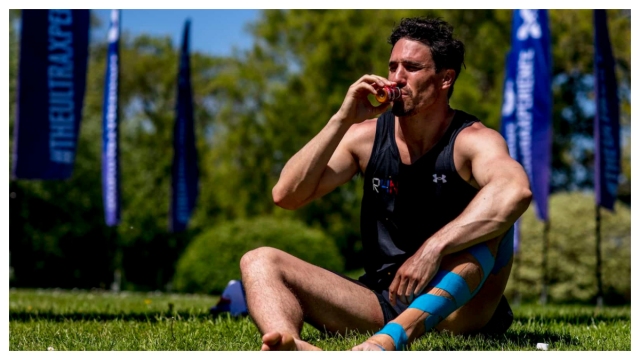
Fueling for a marathon: Why is it so important?

How to Train for a Marathon: Complete Guide for Beginners & Advanced Runners
